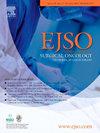接受盆腔后外翻术的晚期卵巢癌患者是否必须接受全直肠系膜切除术?前瞻性卵巢癌队列中直肠间隙受累的预后作用
IF 3.5
2区 医学
Q2 ONCOLOGY
引用次数: 0
摘要
本文章由计算机程序翻译,如有差异,请以英文原文为准。
Is total mesorectal excision mandatory in advanced ovarian cancer patients undergoing posterior pelvic exenteration? Prognostic role of mesorectal space involvement in a prospective ovarian cancer cohort
Introduction
In advanced epithelial ovarian cancer (AEOC), debulking surgery with posterior pelvic exenteration (PPE) is performed in 35–70 % of the patients to achieve no macroscopic residual disease.
This study aims to evaluate the incidence of mesorectal involvement and its prognostic role in AEOC patients undergoing PPE.
Materials and methods
This prospective study analyzes data from a cohort of AEOC patients who underwent primary debulking surgery (PDS) or interval debulking surgery (IDS) with PPE at the Léon Bérard Cancer Center in Lyon between 2018 and 2022.
Results
73 patients underwent debulking surgery with PPE during the study period.
27 (34 %) underwent PPE during PDS and 46 (66 %) during IDS. 23 patients (31.5 %) had only serosal involvement, 19 (26 %) had bowel involvement up to the muscularis propria, and 7 (9.6 %) had up to the mucosa. Mesorectal involvement was observed in 40 cases (54.7 %) and was significantly associated with positive MLNs and higher liver recurrence rates. Hepatic metastases had an early onset (months, 9.8 vs 28.8; p = 0.0001) and were correlated with poorer OS (months, 20.9 vs 51.5) compared to recurrences in other sites.
The persistence of positive mesorectum after neoadjuvant chemotherapy in the IDS group seemed to be linked to poor OS (NR vs 42.7 months).
Conclusions
Debulking surgery with PPE in AEOC patients is often needed. Total mesorectal excision should be performed in AEOC to achieve no residual disease because positive mesorectum after neoadjuvant chemotherapy seemed to be linked with poor OS, with early onset and increased incidence of liver metastasis.
求助全文
通过发布文献求助,成功后即可免费获取论文全文。
去求助
来源期刊

Ejso
医学-外科
CiteScore
6.40
自引率
2.60%
发文量
1148
审稿时长
41 days
期刊介绍:
JSO - European Journal of Surgical Oncology ("the Journal of Cancer Surgery") is the Official Journal of the European Society of Surgical Oncology and BASO ~ the Association for Cancer Surgery.
The EJSO aims to advance surgical oncology research and practice through the publication of original research articles, review articles, editorials, debates and correspondence.
 求助内容:
求助内容: 应助结果提醒方式:
应助结果提醒方式:


